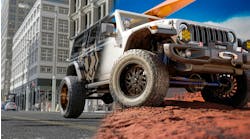A Washington State House bill that intended to establish rolling resistance standards for passenger and light truck tires "is dead," according to the Tire Industry Assocation (TIA).
"My understanding is that it's sitting in committee and didn't get a vote," Roy Littlefield IV, vice president of government affairs for TIA, told MTD. "It was supposed to make it out of committee today."
House Bill 2262, if it had passed, would have given the Washington Department of Commerce the ability to adopt and implement any combination of the following:
- A database of “replacement tires in production offered for sale or distribution in the state;
- “Requirements for any tire brand name owners and manufacturers with replacement tires in production offered for sale or distribution in the state to report information necessary to implement this section;
- “A rating system for the energy efficiency of replacement tires based on their rolling resistance coefficient;
- Testing procedures in alignment with enacted regulations by the National Highway Transportation Safety Administration as they existed, as of the effective date of this section, and:
- “Minimum energy efficiency standards for replacement tires based on their rolling resistance.”
The bill also would have given regulators the ability to “require energy efficiency ratings... be displayed to consumers at the physical or online point of sale.”
In addition, according to language in the bill, the Washington Department of Commerce would have prohibited "the sale or offer for sale of replacement tires that do not meet the minimum energy efficiency standards” set forth by the state.
“Any rules adopted by the department prohibiting the sale or offer for sale of replacement tires based on their rolling resistance may not adversely affect tire safety or tire longevity as demonstrated by the independent testing of wet grip or traction and treadwear by an analyst prepared for the department or another state energy office and verified by the department.”
Exemptions would have been provided for winter tires, spare tires, “tires manufactured specifically for use in vehicles with three or fewer wheels or tires manufactured specifically for use in an off-road recreational or agricultural motor vehicle.”
Any person or entity that violated rules established by the bill would have been "issued a warning by the department or another state agency as designated by the department for any first violation.
“Repeat violations are subject to a civil penalty ranging from $100 to $10,000 per occurrence.”
The State of Washington also would have reserved the right to “carry out inspections of replacement tires sold or offered for sale.”
According to the bill's language, adoption of “reasonable replacement tire energy efficiency standards" could have resulted in an approximate cumulative reduction” of 600 million gallons of gasoline “and 1,500 gigawatt hours of electricity.”
This would have translated into “savings” of $3 billion “in transportation costs for Washington drivers,” plus a 5 million metric ton reduction of carbon dioxide from the year 2026 through 2035, “assuming a 10% reduction in rolling resistance improves gasoline fuel efficiency by 3% and electricity fuel efficiency by 8%.”
Click here to view House Bill 2262.




